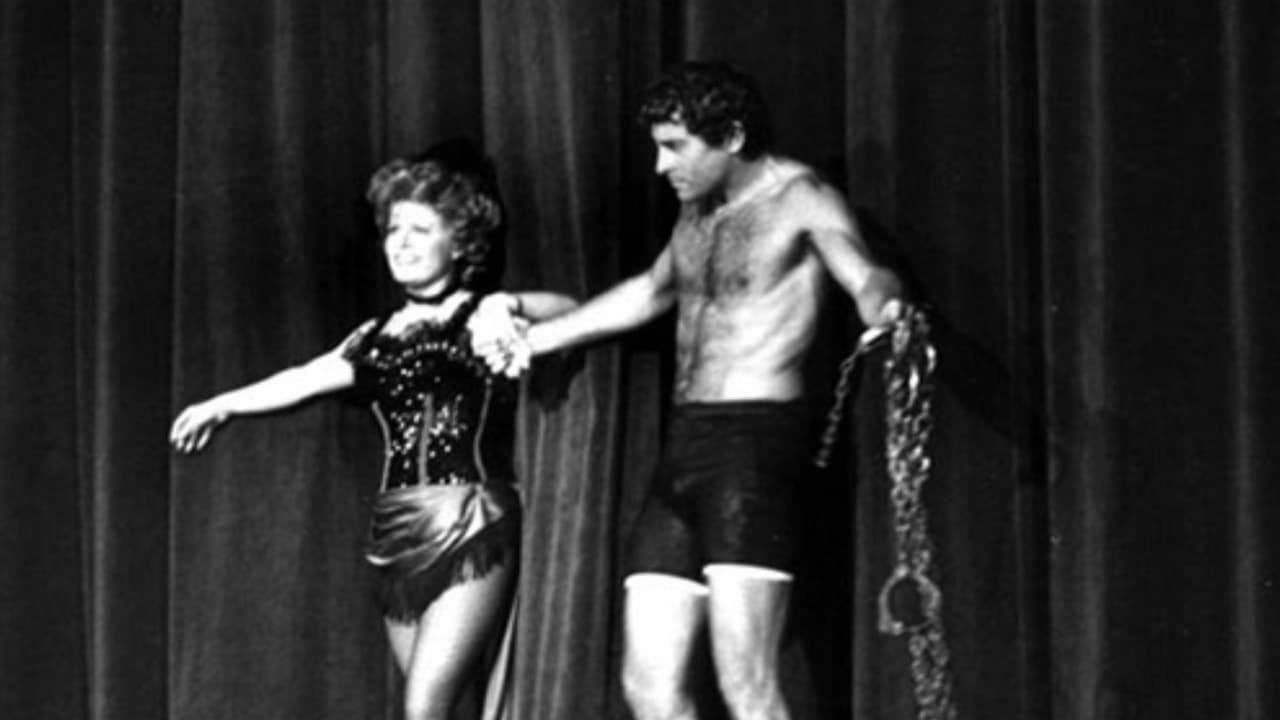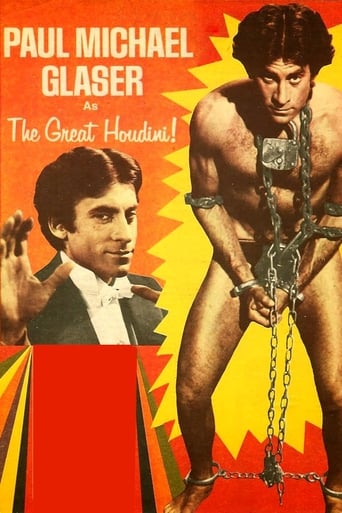Claysaba
Excellent, Without a doubt!!
TrueHello
Fun premise, good actors, bad writing. This film seemed to have potential at the beginning but it quickly devolves into a trite action film. Ultimately it's very boring.
Leoni Haney
Yes, absolutely, there is fun to be had, as well as many, many things to go boom, all amid an atmospheric urban jungle.
Nicole
I enjoyed watching this film and would recommend other to give it a try , (as I am) but this movie, although enjoyable to watch due to the better than average acting fails to add anything new to its storyline that is all too familiar to these types of movies.
clanciai
Another outrageously ignored, underrated and neglected biopic excellently staged on film with great performances everywhere, especially by Paul Michael Glaser, Sally Struthers and Ruth Gordon as the three main characters in the complicated relationships between son, mother and wife, the two latter having problems with each other, the wife coming between the mother and son and the mother always intruding in his marriage even after her death. The best scene is the first London scene, when Houdini accidentally meets Sir Arthur Conan Doyle (Peter Cushing, not very like the real Doyle) and the director of Scotland Yard (the old incorrigible Wilfred Hyde-White) with consequences. The development of the relationship between Houdini and Doyle is true to history, they actually became almost enemies after having started as true friends understanding each other, while Houdini never could accept Doyle's weakness for elves. The spiritualistic part of the story though gives Doyle the right, who survived Houdini with five years, and this is actually the most interesting part of his story. All the tricks with his constantly risking his life twice a day ("and thrice on Saturdays") is all too well known, so not more than necessarily much celluloid is spent on all that, while the drama is his personal relationships. The domestic family scenes and the one in Budapest are priceless for very convincing insights, especially the Jewish wedding scene at home. The jewel in the crown however is the fantastic performance by Vivian Vance as the nurse and indispensable factotum who actually both introduces the drama and finishes it, in a very clearly surveyable interesting and skillful composition to explain the extraordinary life of one of the greatest magicians ever.
JasparLamarCrabb
An extremely well made TV-movie directed by Melville Shavelson and starring Paul Michael Glaser as Harry Houdini. The films tracks the great magician's rise to fame in the early 1900s, his smashing success in London (where he befriends author Arthur Conan Doyle), and his ultimate demise in 1926. Covering Houdini's obsession with debunking spiritualists of the day, the film has quite a number of creepy séance scenes. Glaser is quite energetic in the title role and he's well paired with Sally Struthers as his infinitely patient wife Bess. Ruth Gordon is miscast as Houdini's meddlesome and highly intolerant mother. It's a role better suited for Shelley Winters. Director Shavelson (along with co-writer Peter Benchley) moves things along briskly. The supporting cast includes Adrienne Barbeau, Jack Carter, Peter Cushing (as Conan Doyle), Maureen O'Sullivan and Vivian Vance, who steals her scenes as the Houdini's wise-cracking live-in nurse.
theowinthrop
Except for the 18th Century criminal, Jack Sheppard, who managed to escape from Newgate Prison four times in two years, Harry Houdini is the greatest escapologist (as an expert in escaping traps or prisons is called) in modern times. He was an above average magician, and a first rate show-man as well, but the man who got out of prison cells, out of chains in locked trunks, out of trunks dunked into ice covered rivers, has never been forgotten - even though he died 80 years ago (on October 31, 1926 to be exact). It helped Houdini's reputation and fame that he also became an acute critic and exposer of spiritualists and their rackets. He was one of the few members of the magician profession who became a genuinely interesting public figure.Most people recall Houdini as the subject of the film of that name starring Tony Curtis. It's a good movie, but it has too many fictional devices in the plot (some good, some inexplicable) to make it a reliable guide to the life of the man. This 1976 television film was far better. It is not flawless, but it has more of the personal problems of the man's career in it, and (unlike the Curtis film) it does show the death of Houdini correctly.For one thing, it comments on the marriage of Harry and Bess Houdini, and Bess's struggles with her mother-in-law. Harry Houdini was originally Erich Weiss, an immigrant boy from Hungary who was Jewish. His family settled in Wisconsin. His father died early, so Erich was very close to his mother. Despite the change of his name for professional reasons ("Houdini" is based on the famous French magician, Robert-Houdin). When Harry married Bess, Mrs. Weiss was not happy about it: Bess was Catholic. Mrs.Weiss (Ruth Gordon) tells Bess (Sally Struthers) why she is not sure about the success of the marriage. "Look at me", she tells Struthers,"I'm five thousand years old!" She means that she knows the history of the persecutions of Jews by non-Jews, so despite Struthers' protestations of affection she is not sure of their worth.Although it does not delve deeply into the spiritualist matter as one would wish (and as a recent film with Harvey Keitel and Peter O'Toole did)it touches on it enough to show the rise and fall of the friendship between Houdini and Sir Arthur Conan Doyle (Peter Cushing). Both men liked each other, but they were coming from different ends of the spectrum on the subject of accepting the "evidence" of spiritualists. Houdini's mother had died, and he did want to find proof of an afterlife - but no spiritualist ever appeared whom he could not analyze and expose. Conan Doyle had been interested in the occult since the 1880s, but the deaths of his mother and oldest son Kingsley (and several other friends and relatives) in World War I made him a too ready convert to accepting Spiritualism as a new, necessary religion to help ease the pains of millions of people. Inevitably they would have parted as friends. What happened was that Sir Arthur's wife had a trance where she got a message from Mrs. Weiss. Sir Arthur and his wife gave the message (supposedly written by Mrs. Weiss using Lady Conan Doyle as her medium) to Houdini. He read it. Possibly if he had thanked Sir Arthur and said he would think about it, he would have kept the friendship. Instead (as this film shows) Houdini pointed out that his mother could not write in English her entire life. The Conan Doyles felt this was a slur on the integrity of Lady Conan Doyle.He never did get through to the other side. But the film suggests, at the end, that a decade or so after his death he managed to use another medium (Bill Bixby) to send a message to Bess. That is a pleasant fiction that hurts the film's usual truthfulness. One wishes he could have done so - but it didn't happen.Glaser, Struthers, Gordon, Cushing, Bixby, Vivian Vance (as a nurse who becomes a friend of Struthers), and Wilfred Hyde-White all perform well in this film. Except for the pleasant white lie at the end, it is an excellent place to begin looking at one of the most fascinating figures in 20th Century entertainment.
LFoxylala
I have seen this TV movie twice, and have been searching for a copy of the video to purchase. I've seen other Houdini movies and biographies, but this is one I really want. Paul Michael Glaser and Sally Struthers were very real in their portrayal of Harry (Erich Weiss) Houdini and his wife, Bess.

